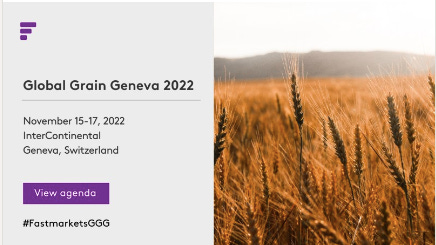The FAO World Food Price Index fell 1.1 per cent in September but remains 5.5 per cent higher than a year ago. Vegetable oil prices led the decline, falling by 6.6 per cent over the month to reach their lowest level since February 2021. Malaysia's rising palm oil inventories helped drive the fall in veg-oil prices.
However, the US consumer food price index rose 0.8 per cent in September, bringing the 12-month increase to 11.2 per cent. The wider CPI rose 0.4 per cent in September, bringing the 12-month inflation rate to 8.2 per cent.
The number of vessels waiting to sail to or from Ukrainian ports under the UN-backed grain deal reached a record high of 120 at the end of last week due to a shortage of inspectors. Ukraine has shipped more than 6.9 mln mt of grain and oilseeds since the deal came into force on 1st August.
Russia’s renewed bombing campaign drove wheat prices higher early in the week on fears Russia may not continue the deal when it expires in November. Russia's Geneva UN ambassador added fuel to the fire when he told Reuters on Thursday that Moscow may not renew the agreement unless it addresses its demands on food and fertiliser exports.
Russia is considering abolishing its grain export quota due to a bumper crop. The county’s farmers have already harvested 103 million mt of wheat, up 36 per cent yearly.
China has set its 2023 grain import quota at the same level as last year, with wheat at 9.636 mln mt, corn at 7.2 mln and rice at 5.32 mln. China may import corn from Brazil as early as December to reduce its dependence on the US and replace supplies from Ukraine.
Argentina may tighten restrictions on wheat exports after drought reduced crop estimates from 19 mln mt to 16 mln.
US farmers are planting winter wheat through a third straight year of drought. Weather forecasts suggest dry conditions could stay. A lack of rain and snow has withered summer crops like tomatoes and onions and threatened leafy greens grown in the winter.
Heavy rainfall in India has damaged crops just before harvesting, raising fears that the government may impose additional restrictions on food exports.
A strong US dollar, high commodity prices and rising interest rates are destroying demand for grains and oilseeds in developing countries. Cargill’s head of trading told Bloomberg that, as a result, global trade flows might fall by 5-6 per cent for wheat and 2-3 per cent for corn and soybean meal.
Higher world wheat prices and a weak yen are already encouraging Japan's food producers to promote domestic consumption of rice flour-based products. Domestic rice consumption has been falling over the years as more Japanese turn to bread and noodles.
Foreign Policy Magazine dedicates its autumn issue to food supply chains, arguing that “the solution to the global food crisis isn’t more food.” The FT also has a long read on the future of farming and regenerative agriculture.
In company news, Bloomberg questions why Cargill is so successful. (Spoiler: it’s private ownership.)
Brokers expect dry bulk freight rates to strengthen slightly into year-end and to weaken in 2023. However, 2023 could see net zero growth in the world’s dry-bulk fleet, while 2024 could see more tonnage exit the fleet than enter. Meanwhile, container rates have fallen to pre-pandemic levels despite operators removing tonnage.
Brazil’s so-called “Ethanol King” is hedging his ethanol investments and has bought a minority share in Vale, the Brazilian mining company. Vale is a major supplier of nickel, a key ingredient in electric-vehicle batteries.
Honeywell International will commercialise technology using ethanol to produce sustainable aviation fuel (SAF). The company says its technology can cut GHG emissions by 80 per cent compared with petroleum-based jet fuel.
In environmental news, US food producers are removing “best before” labels that account for seven per cent of US food waste — or four mln mt annually.
The UK government could lose farm votes if it abandons plans to replace EU land-based subsidies with environment-based ones.
Environmentalists have criticised the UK government over a plan to ban solar panels on farmland. The ban could threaten planned investments of £20 billion.
Even so, pilot projects in Spain show that solar panels can help farmers by creating shade and reducing water loss.
There was good news from India where farmers in Punjab are moving away from burning paddy rice stubble and ploughing it back into the land, where it breaks down and acts as a natural fertiliser.
There was bad news this week for alt-meat producers. A survey of Generation Z – people born after 1996 – found that just 14 per cent said they consume plant-based meat, and 23 per cent of those who do, say they plan to eat less plant-based meat in the future.
The plant-based Beyond Meat company may further reduce staff levels as rising inflation drives consumers toward less-expensive animal proteins.
National Geographic does a deep-dive into the future of alt-meat, asking if it will ever satisfy the US hunger for the real deal.
New Zealand plans to tax agricultural emissions from livestock and introduce an “agricultural emissions-pricing system” in 2025. The country’s farming federation is “deeply unimpressed
Finally, a Turkish livestock farmer has fitted virtual reality (VR) headsets to his cows, transporting them to virtual pastures. It boosted milk yields.
Many of the above links require subscriptions. Please support quality journalism.
© Commodity Conversations ® 2022


